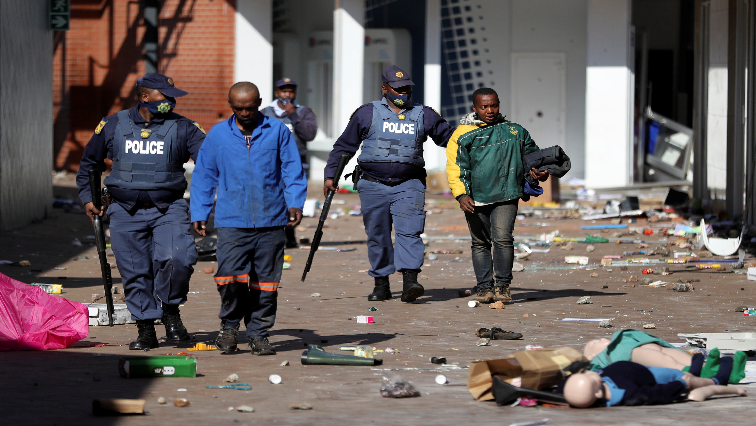It is a month after the looting and unrest in some parts of Gauteng and KwaZulu- Natal, followed by a damning diagnosis. South Africa’s police and intelligence service are not equal to the task of dealing effectively with security threats.
These are the shared views of a security expert and a political analyst. They say political factions rooted deep in law enforcement agencies are the main problem.
Firstly, it was a Constitutional Court order which was defied by a former head of state, Jacob Zuma. And then, the Nkandla gathering but the rhythmic dance was perhaps a warning shot.
Waves of violence and looting were unleashed, a week after former president Jacob Zuma’s incarceration. KwaZulu-Natal and Gauteng were left in the grip of anarchy.
VIDEO: Businesses in parts of Gauteng and KZN continue to bear the brunt due to sporadic looting
And the body count mounted as businesses were targeted. Almost three weeks later, the dust started to settle and efforts to clear the rubble began. Some guilt-ridden looters came forward to clear their conscience.
“Have you ever done something and then regret it later? What happened was wrong, it doesn’t make me happy.” says ‘James’ an alleged looter at Bara Mall.
But the aftermath was overwhelming. Even pharmacies and surgeries did not escape the mayhem. But a question remains; was poverty to blame?
“Poverty is a huge problem in this country. But if we blamed their poverty for what happened, then we actually miss what really happened,” says Prof. Steven Friedman a political analyst.
The looting pointed to a dirty game of politics.
“There’s no economic motive for doing any of those things. Instead, it was quite clearly, groups of people who had a political interest in causing harm. And who unfortunately had the means to do that.” adds Prof. Friedman.
But there were clear blunders by the security cluster.
“They were caught unprepared, reacted quite slowly. And then the situation escalated out of control, the police are in a crisis, the military is in a crisis. Intelligence is very, very clearly been instrumentalised for other purposes. The weaknesses that permeated both the police and the prosecution and other services.” says Jakkie Cilliers, Founder: Institute for Security Studies
“There are factions within the intelligence services, and within the police services, which mean that not everybody is loyal to the country they’re loyal to their faction,” says Prof Friedman.
So far, only six alleged instigators have appeared in court. But they have all been released on bail. There is no single high-profile suspect among them.
“With the greatest respect if you think you’re solving the problem by prosecuting five or six people who are saying inflammatory things in public, then you’ve totally missed the point and I’m afraid, that is the reality we sit with at the moment,” says Prof. Friedman.
But the National Prosecuting Authority (NPA) can only prosecute. Police must effect arrests. And the cases are only as good as the evidence presented.
“It’s a very old South African problem. We’ve never had an efficient police force in this country, or police service, whatever the term you want to use It,” says Prof. Friedman.
The NPA could not be reached for comment despite numerous calls. Police Colonel Brenda Muridili said they won’t comment further at this stage, citing the recent presidential appointment of a panel of experts to look into the security clusters’ response during this crisis.
Facing charges of inciting violence and terrorism among others all six suspected instigators are expected back in court between the 2nd of September and the 21st of October.


